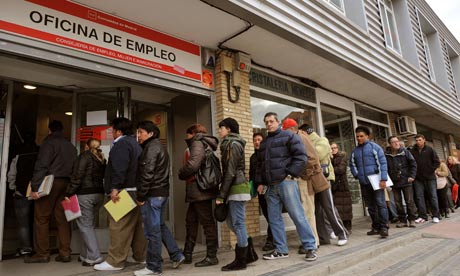
People wait for an employment office to open in Madrid. Photograph: Bloomberg via Getty Images
One in 10 Europeans are unemployed. In some corners of the EU over 50% of young people have no jobs. Enough of the problems – what are the solutions?
Four months ago, the Guardian teamed up with five other papers from the largest EU countries to investigate the European predicament and seek to tease out solutions. We asked what the EU was for, what it did well, and where it was failing its 500 million citizens.
Since then, the European fiscal crisis has deepened. The economic mayhem has left 25 million EU citizens out of work - a number that is greater than the populations of most countries in the union, a costly travesty of wasted talent and failed leadership.
So, for our second collaboration, the Europa team – the Guardian, Le Monde, El País, La Stampa, Gazeta Wyborcza and Süddeutsche Zeitung– is asking what can be done to get Europe back to work.
Online, and in Thursday's Guardian, we look at where the jobs are in Europe: there are, in fact, hundreds of thousands of vacancies. We examind the regions that are successfully creating employment (Germany, for example, has more people in work than ever before). And we ask whether jobs services at the national level are still relevant.
On Thursday, and in Friday's paper, we ask whether we are training our young people properly for the world of work, and whether a university degree is still value for money. We examine more practically minded establishments, such as the German Fachhochschulen, which seem to offer their students better employment prospects.
We will hold an open careers session online on Thursday. We want to know: do our findings tally with your experiences, as a recruiter or an applicant? Help us find out more about how employment experiences compare across Europe.
Where is the work? What is being done about joblessness where you are? Is a degree still seen as a worth the investment of time and money where you live or are working? Is Europe's predicament cyclical or the start of a long-term decline?
source: the Guardian
source: the Guardian
No comments:
Post a Comment